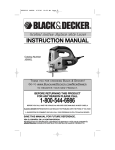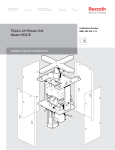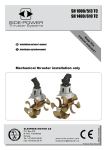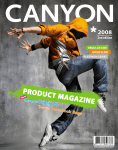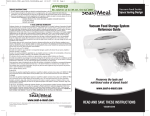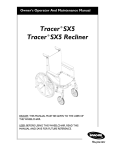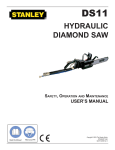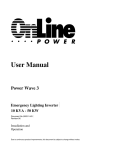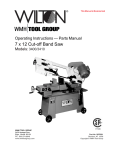Download Bosch Rextroth TSplus Technical data
Transcript
TSplus Carousel Configuration Basic Equipment Guide R980 500 388 (6.2010) TSplus Carousel Basic Equipment Guide Bosch Rexroth Corporation 2 Table of Contents Important Safety Infomation....................................... 3 Introduction................................................................ 4 Leveling and aligning.......................................... 22 Fitting the flat-top GT2 chain............................. 23 Checking the Motor Rotation............................. 27 Extending and breaking the chain...................... 28 Application and Function............................................ 5 Design and Detailed Description................................ 6 Technical Data...................................................... 7 Carousel Drive Module......................................... 8 TSplus Conveyor Chain Section Carousel.......... 10 Connection Links............................................... 12 Cross Links........................................................ 12 Chain.................................................................. 13 Foundation bracket/Foundation anchor kit........ 13 Initial Start-up........................................................... 29 Maintenance............................................................. 30 Repair....................................................................... 31 Replacing the guide profile................................ 31 Replacing the sprockets..................................... 32 Replacing the motor........................................... 33 Assembly................................................................... 14 Leg Set Assembly............................................... 14 Fitting leg sets to the Carousel drive module.... 16 Extending the conveyor section......................... 19 Fitting the cross links......................................... 21 Module Warranty Liability BOSCH REXROTH CORPORATION warrants to the original purchaser the modules manufactured by us to be free from defects in materials and workmanship under normal use and service. Our obligation under this warranty shall be limited to the repair or exchange of any part or parts which may thus prove defective under normal use and service within one (1) year from date of installation by the original purchaser. THIS WARRANTY IS EXPRESSLY IN LIEU OF ALL OTHER WARRANTIES EXPRESSED OR IMPLIED, INCLUDING THE WARRANTY OF MERCHANTABILITY OR FITNESS FOR USE, AND WE NEITHER MAKE NOR AUTHORIZE ANY OTHER PERSON TO MAKE FOR US, ANY WARRANTY IN CONNECTION WITH THE SALE. In no event can the manufacturer accept warranty claims or liability claims for damages resulting from improper use or misuse of the equipment or as a result of changes made to the equipment other than those authorized by the manufacturer. The manufacturer will accept no claim in which non-original spare parts have been used. This warranty shall not apply to the modules or any part thereof that has been subject to accident, negligence, alteration, disassembly, abuse, or misuse after delivery by us. The term “Original Purchaser”, as used in this warranty, shall be deemed to mean the customer to whom the modules were originally sold. Our obligation under this warranty is limited to the modules only, and excludes wear items, such as belts, etc., and we may not be responsible for system concept, design, engineering, or function beyond this. Environmental Protection Always dispose of worn, damaged or obsolete parts in a responsible manner. Some components, such as gearboxes, contain lubricating oil which can pollute the environment. It is the user’s responsibility to dispose of all hazardous material within the components following all local, state and federal guidelines. All rights are held by ROBERT BOSCH GMBH and BOSCH REXROTH CORPORATION, also regarding patent claims. We retain all powers of disposition, such as for copying and/or for passing-on to third parties. We reserve the right to make technical changes at any time without notice. Errors and omissions excepted. © 2010 Bosch Rexroth Corporation 3 Bosch Rexroth Corporation TSplus Carousel Basic Equipment Guide R980 500 388 (6.2010) Important Safety Information! IMPORTANT: This manual must be reviewed with all equipment operators as part of your operator training program! SAFETY FIRST! Important safety information is contained throughout this manual to alert you to potentially dangerous situations and help prevent accidental injury and property damage. The safety warning symbol above has been included to warn you of hazards that can hurt or kill you and others, and/or cause serious damage to the equipment and other property. In addition, the following safety alert words are used: DANGER! Means that you or others will be seriously or fatally injured if instructions are not followed. WARNING! Means that you or others may be seriously or fatally injured if instructions are not followed. CAUTION! Means that you or others may be injured if instructions are not followed. Material Hazards: Some components, such as gearboxes, contain lubricants or other materials that can represent a potential health hazard if handled, stored, or disposed of improperly. Please contact Bosch for copies of the Material Safety Data Sheets (MSDS) for the lubricating oil used in gearboxes and other potentially hazardous materials. Review All Safety Information: Please review the safety information included on this page and throughout this manual with all installers, operators, and maintenance personnel of this equipment. SAVE THESE INSTRUCTIONS WARNING! Please read all assembly, and maintenance instructions carefully before beginning set-up of the components in this document. Where appropriate, warning symbols have been included in this publication to alert you of potential or impending danger. • Be sure to read and observe all safety warnings in this document as well as those attached to the individual modules. Failure to do so could result in potential risks to your health and safety as well as those around you. • Covers and guards have been designed to eliminate pinch points and exposure to moving chains and gears. DO NOT operate the conveyor or any of the other components in the system with the guards removed. Serious injury may result! • All set-up maintenance and repair work should be performed only by properly trained, qualified personnel. All operators must be properly trained in the use of this equipment. • A qualified electrician must make all electrical connections when wiring the components installed in the TSplus system. Be sure to follow all local, state and federal regulations when installing electrical devices of any type. The customer assumes responsibility for the control system, and must provide an EMERGENCYOFF SWITCH or switches for all workstation operators to meet all applicable industry and OSHA requirements. In general, emergency-off switches must be present at easily accessible locations for all operators of the installed TSplus conveyor system. • All power supplies must be LOCKED OUT before beginning maintenance or repair work of any type on the conveyor system. Proper LOCK OUT procedures include the identification of the locked out power supply with a tag to prevent the accidental restoration of power. • TSplus pneumatic components are designed to operate in a range of 4–6 Bar (58–87 psi). It is the users responsibility to install a filtered, regulated air supply to limit the pressure to that recommended by the manufacturer. Before beginning any maintenance or repair, bleed off the pressure lines to all components to prevent unexpected or accidental movement of a system component which could result in personal injury. • TSplus drives, returns and conveyor sections and components are designed to transport Bosch Rexroth WT2, WT2/A, WT2/A-H workpiece pallets. Proper usage is defined as the transport and positioning of parts and assemblies via the workpiece pallet and fixture during the assembly process. In no instances should the pallet payload, the downward force applied to the pallet, or the total load carrying capacity of the entire system be exceeded. Exceeding published specifications will result in premature wear or system failure and may cause damage to the motor, gearbox, roller chain, seals and other components. • CAUTION! Do not operate or work near mechanical equipment when wearing loose clothing. Moving components such as roller chain, drive belts, drive shafts and pallets can snag long belts, scarves, ties and other loose fitting garments, pull the worker into the equipment and cause serious, or in extreme cases, life threatening injury. • CAUTION! Operators having long hair must wear appropriate head protection (hair nets, hats, and hair caps) to minimize the risk associated with working near moving machinery. Hanging hair can get caught in moving components such as flat-top chain, drive belts, drive shafts and pallets, pull the worker into the equipment and cause serious, or in extreme cases, life threatening injury. WARNING! Employees must be instructed in safety requirements. Refer to Rexroth document 3842527147 (02.2008), “Instructing Employees on Safety” for an overview of the dangers, instructions and references to regulations and standards for employees who operate, maintain, repair or who work on or near Rexroth conveyor transport systems. A pdf of this multi-language document can be downloaded at: BoschRexroth-us.com/ BRLCatalogs by clicking on “Manuals and Product Updates” R980 500 388 (6.2010) TSplus Carousel Basic Equipment Guide Introduction Like all Bosch Rexroth flexible assembly systems, TSplus is constructed solely from standardized modules that are precisely matched to each other. One important benefit of this modular design is that you can interlink manual and automatic work stations freely, making TSplus suitable for virtually any assembly task. Another is that you can easily expand a TSplus installation: Use TSplus alone as a closed system, or as a sub-installation in a higher-order materialshandling, manufacturing or assembly system. • • About this manual The manual is divided into the following sections to make it easier to use: • Application and Function Gives general information about the TSplus conveyor. Modules for pallet control are also required and vary according to the configuration of the system. These modules are described in separate manuals and include the following • Technical Data Provides the most important technical specifications. • Design and Detailed Description Supplies an overview of the modules that make up the basic TSplus conveyor. This section will familiarize you with the conveyor’s individual components. • Assembly Lists step-by-step instructions for setting up the conveyor. • Initial Start-up Describes the final procedures for get-ting the conveyor up and running. • Maintenance Provides information on preventive maintenance. Repair Gives step-by-step procedures for re-placing any parts subjected to wear. This manual describes the basic equipment for a TSplus flat-top chain conveyor arranged in oval configuration: • Carousel drive • Chain sections (straight and curved) • Leg sets • Cross links • Foundation brackets • Chain • Cushioned and Standard Stop Gates, Rockers • Proximity Switch Mounting Kits • Accumulation Control Kits • Code Programmers, Code Memory Blocks, Code Readers • Transverse Conveyors • Lift-Transverse Units • Lift-Position Units • Lift-Rotate Units Contact Rexroth for information on this or any other module for flexible assembly. Bosch Rexroth Corporation 4 5 Bosch Rexroth Corporation TSplus Carousel Basic Equipment Guide Application and Function The flat-top chain version of the Bosch Rexroth TSplus conveyor uses dual strands of sideflexing flat-top chain as its transport medium. The low coefficient of friction with the workpiece pallets allows pallets to be stopped on the conveyor while the chain continies to move beneath them. It is thus possible to queue workpiece pallets as work processes are performed either manually or automatically. The dual chain (open center) conveyor design provides access to the fixtured workpiece from all sides. The chains themselves are tracked along the top chain-guide profiles and are driven at constant speed by means of drive sprockets. The carousel drive system is designed for a maximum supported load weight 175 kg to 815 kg. Important Information The carousel configuration is economical because it minimizes the number of drives, transfer modules, and chain required. It does not use a return unit. It consists of four 90° or two 180° curved sections and an appropriate number of straight sections. Not only is this configuration easy to set up, but controls complexity is kept to a minimum because of reduced I/O requirements. The carousel drive powers the side flexing flat-top chain through the carousel configuration. For maximum efficiency, the drive unit should be placed at the "downstream" end of the longest straight section. Ordering parameters allow you to specify the motor voltage and frequency, conveyor speed, and drive width. The gear reducer and motor are located in the mid-mounted position. Leg sets are not included and are ordered separately based on conveyor transport heights. R980 500 388 (6.2010) R980 500 388 (6.2010) TSplus Carousel Basic Equipment Guide Bosch Rexroth Corporation 6 Design and Detailed Description The TSplus basic carousel conveyor configuration consists of the following modules: 10 9 1. Carousel Drive module (AS2/CAR) 2. Leg Sets (SZ2/E) 3. Conveyor Profile 4. Connection links 5. Cross Connector (QV2) 6. Foundation brackets and floor anchors 7. Flat-top chain (GT2/C) 8. Straight conveyor chain sections (ST2/C-100) complete with two anodized aluminum chain profiles (SP2/C), with upper slide profile (GP2) and plastic slide profile (FP2) installed. 9. Drive Leg Set (SZ2/CAR) 10. Curved conveyor sections 4 (KU2/O-90) or 2 (KU2/O-180) complete with two anodized aluminum chain profiles (SP21C), with upper slide profile (GP2) and plastic slide profile (FP2) installed. 7 Bosch Rexroth Corporation TSplus Carousel Basic Equipment Guide R980 500 388 (6.2010) Technical Data for AS2/CAR Nominal conveyor speed = See Below Table Permissible loading weight = 175 kg to 815 kg Maximum conveyor unit length = 30.5 m (100 ft.) Motor electrical specifications = See Below Table eters 0.5 m Max. =3 ength L Electrical data for Carousel Drives Units AS2/CAR Nom. M/min Actual Speed RPM HP 6 9 12 18 5.1 9.4 11.8 18.8 1140 1725 1725 1725 1 1.5 1.5 2 Full Load Amps @ 60 Hz 208/60 n/a n/a n/a n/a 230/60 4.0 4.4 4.4 6.0 460/60 2.0 2.2 2.2 3.0 575/60 1.7 1.75 1.75 1.85 NOTE: Electrical Data for reference only. Refer to motor name plate for actual amperage ratings. Guards removed for clarity B + 243 B - 75 B + 15 Dimensional data for AS2/CAR 1250 Transport height 1063 600 444 386 Connection link (included) R980 500 388 (6.2010) TSplus Carousel Basic Equipment Guide 8 Bosch Rexroth Corporation Carousel Drive Module AS2/CAR The TSplus flat-top chain (FTC) carousel drive module AS2/CAR (Fig. 1) is delivered completely assembled and ready to be mounted to ST2/C-100 and KU2/O-90/180 conveyor chain sections. 6 13 13 19 14 12 8 9 11 17 10 15 3 18 4 8 7 12 1 2 12 13 8 4 3 5 16 15 18 13 8 1 2 Fig. 1 The AS2/CAR carousel drive module consists of the following main components: 1. 2. 3. 4. 5. 6. Gear Reducer Motor Chain Tensioner Drive Chain Conveyor Section In-Feed Conveyor Section Out-Feed 7. Idling Wheel 8. Drive Chain Sprocket 9. Drive Shaft FTC 10. Idler Sprocket FTC 11. Drive Sprocket FTC 12. Side Cover 13. 14. 15. 16. 17. 18. 19. Flange Bearing Guide Block Connection Link Drive Shaft Chain Guard/Rollers Gusset Top & Inside Covers 9 Bosch Rexroth Corporation TSplus Carousel Basic Equipment Guide R980 500 388 (6.2010) 29 R980 500 Rexroth 388 4/10Corporation Bosch Drive Module AS2/CAR (Fig 3a) Carousel Drive Module AS2/CAR In the TSplus AS2/CAR carousel flat top chain (FTC) drive, the Gear Reducer (1) is powered by an AC Motor (2) which rotates clockwise solid Drive Shaft (16). Attached via a Drive Chain Sprocket (8) to the Carousel Drive Module AS2/CAR (Fig. 1) solid Drive Shaft (16) and to Drive Shaft FTC (9), to which these two are connected by means of the Drive • In the TSplus carousel (3)•maintains • The AS2/CAR Drive via Module is The Chain (17)on contains Chain (4). AAS2/CAR Chain Tensioner theGuard tension the drive chain. And positioned a two flat top chain (FTC) drive, the supported means of a Leg Set the transport chain when it is Sprocket Drive FTC (11) on the Drive Shaft FTC (9) and rotating clockwise and the shaft is supported with Gear Reducer (1) is powered by SZ2/CAR (Fig. 2). The carousel conducted around an Idling Flange Bearing (13).rotates an AC Motor (2) which drive leg set is designed speWheel (7) and back up around the direct Drive Shaft (16) clockwise. The rotation of the drive 410 Cha H e i gi n ht H • 60 • BW SZ2/CAR Fig. 2 Fig. 3b BW T-75 T+15 45 • cifically to support the carou- turn are connected by means of • The AS2/CAR Drive Module conthe Drive Chain (4). The Chain • The Leg Set SZ2/CAR is connects to the conveyor chain secThe Chain Guard/Roller (17) tracks the transport chain (FTC) as it travels around Idling Wheel (7) and the Tensioner (3) maintains the tennected underneath the AS2/CAR tion ST2/C-100 and KU2/90/180 rollers guide the workpiece pallets smoothly over the drive module. sion on the drive chain. Drive Module to strut profile curves by means of Connecting by means of a Connecting Link Links (15) and is fastened with Also the Drive Drive Shaft FTC (9) connects (15). Gussets The on AS2/CAR Module to the(18). conveyor chain section ST2/C-100 and KU2/90/180 curves by are two Drive Sprocket FTC means of a Connecting Link (15) and fastened with Gusset (18). (11) , which rotate clockwise. • The Top and Inside Covers (19) The front Top Cover (19) Covers (12) are bolted to the module to ensure safety Drive Shaft and FTC back (9) is and supportand and two two Side Side Covers (12) are during conveyor operation. They alsobolted protect themodule drive from dirt and other contaminants which could result ed by Flange Bearing (13). to the to ensure safety during conveyor operain premature wear of the drive module. The rotation of the drive shaft tion. They also protect the drive and drive sprockets pulls the from dirt and other contamiThe AS2/CAR Drive Module is supported means of a Leg Set SZ2/CAR (Fig. 3b). The carousel drive leg set transport chain (FTC) from the nants which could result in is designed specifically to support carousel drive modules and when it is connected to the conveyor sections. Conveyor Section In-Feed (5) premature wear of the drive over Sprockets FTC module. The the LegDrive Set SZ2/CAR is connected underneath the AS2/CAR Drive Module to strut profile by means of a (11) and into Link the drive module. Connecting (15). 180 • and over the Idler Sprocket FTC sel(FTC) drive module. However a (10).sprockets The Idler Sprocket shaft and drive pulls theguides transport chain from the Conveyor Section standard leg set is also required the transport chain back onto In-Feed (5) over the Sprocket Drive FTC (11) and into the drive module, where it is conducted around an On the Motor Drive Shaft and to support the module entirely the Conveyor Section Out-Feed Idling (7) and then back up around (10)itand the Conveyor on DriveWheel Shaft FTC (9) are Drive where joinsback withonto the main (6). and over the Sprocket Idler FTC Section Out-Feed Chain Sprockets (8),(6). which in conveyor. 15 R980 500 388 (6.2010) TSplus Carousel Basic Equipment Guide Bosch Rexroth Corporation TSplus Conveyor Chain Section The chain conveyor section acts as the bearing surface for the chain, as well as a guide for the workpiece pallets from station to station. Additionally, the chain section as a whole functions as a frame to which other modules and components are mounted, such as stop gates and proximity switches, as well as support and connection elements. All TSplus chain sections consist essentially of three different components, with matched rails shipped together (Fig. 3): 3 Cross Link 1 2 Fig. 3 B+2 1. Aluminum conveyor profile (SP2/C-100) 40 2. Slide Profile (GP2) The TSplus aluminum conveyor profile is anodized and has 10 mm T-slots for inserting M8 T-bolts, T-nuts and other fasteners. Dimensions are shown in Fig. 4. The side guide profile and slide profiles (4x) are pre-attached to the aluminum conveyor profile. The slide profiles serve as chain wear strips and protect the flat-top chain. 45 Pin Each conveyor section includes a label indicating pallet flow to insure correct installation. B-75 B+15 Fig. 4 NOTE: The upper slide profiles are pinned in place at the end of the conveyor profile. For straight sections, the pins are located at the end to the conveyor profile farthest from the drive. For 90° and 180° curve sections, the pins are located at both ends of the conveyor profile. (Fig. 5). 20 10 100 106.5 3. Side Guide Profile (FP2) T LLE PA OW FL Drive End Fig. 5 10 11 Bosch Rexroth Corporation TSplus Carousel Basic Equipment Guide R980 500 388 (6.2010) TSplus Conveyor Chain Section Three basic types of TSplus conveyor sections are available (Fig. 6), depending on the configuration of your system: •Straight sections •90° curve sections •180° curve sections Straight sections can be ordered in lengths from 200 mm to 6000 mm. Curve sections come pre-assembled and their dimensions vary according to the dimensions of the workpiece pallet used in the system. Outer guide A Straight Section BWT Inner guide 610 R 200 180° Curve Section Outer guide A BWT Inner guide 610 R 90° Curve Section A Fig. 6 R980 500 388 (6.2010) TSplus Carousel Basic Equipment Guide Bosch Rexroth Corporation Links Connection Links The conveyor section is extended with the help of connection links, with one per conveyor rail for each conveyor-section joint. The connection link consists of the following parts (Fig. 7): 1 1. Connecting link with four M8 threaded holes 2. M8 hex bolts with lockwashers and backing washers (Qty. 4) 2 Fig. 7 Cross Links The 45x60 strut profile cross links provide extra structural support and ensure that the TSplus conveyor section has a uniform guiding width (Fig. 8). Cross links must be fastened to the conveyor section profiles at a maximum of 2-meter intervals along the conveyor. The length of the cross links is determined by the width of the workpiece pallet or line width. Cross Link Fig. 8 12 13 Bosch Rexroth Corporation TSplus Carousel Basic Equipment Guide R980 500 388 (6.2010) Chains Flat-Top Chain The flat-top chain conveys the workpiece pallet from station to station. The TSplus flat-top chain (Fig. 9) is a wear-resistant, side-flexing #40 chain which has a low-friction, plasticcapped conveying surface. The lack of significant friction allows pallets to be stopped anywhere along the conveyor for processing or assembling operations while the conveyor chain continues to move. Fig. 9 NOTE: To cut down on the time required for master link installation, the chain is delivered in 12-meter rolls, with any amount 6 meters or less delivered as a 6-meter roll. If, for example, your system requires 39 meters of chain, you will receive three 12-meter rolls of chain and one 6-meter roll. Each package also includes one (1) carbon steel master link and one (1) white wear-resistant cap to be used as a master link marker. Foundation Bracket/ Foundation Anchor Kit 2 The leg sets are secured to the floor with the foundation bracket kit and the anchor bolt (Fig. 10). The foundation bracket (1) is fastened to the leg set with two T-bolt mounting kits. The foundation bracket itself is fastened to the floor with the foundation anchor (3), which is suitable for stone and concrete floors. 3 1 Fig. 10 NOTE: Fit foundation brackets to the equipment only after the conveyor equipment has been completely leveled and aligned. Both steel and die-cast aluminum foundation brackets are available. R980 500 388 (6.2010) TSplus Carousel Basic Equipment Guide 14 Bosch Rexroth Corporation Assembly NOTE: The assembly instructions that follow describe the installation of a basic, single-level TSplus transport system. The assembly of other configurations is similar. Recommended Tools The following tools are recommended for assembling the basic system: metric hex wrench set and torque wrench metric Allen wrench set pair spring-washer pliers A2 caliper gauge 90° square soft-faced hammer spirit level (2 - 3 ft.) alignment cord chainbreaker chain assembly tool (supplied with your kit) 1 Fishtape or other thin plastic-coated wire for feeding the chain. Leg sets are shipped pre-assembled from the factory. Assembly instructions are included for adjustment and reference purposes. NOTE: Careful pre-assembly of the leg set will save time during leveling and alignment. It is particularly important to make sure that the leveling feet are all screwed in to the same depth. Pre-assemble the Vertical Posts 1. Set the M16 (A/F 24) hex nut on the leveling foot to 45 mm (Fig. 11). 2. Grease the first 50 mm of the threaded shaft so that screw-in and subsequent adjustment are easier. 3. Screw the leveling foot in by hand until the hex nut touches the end of the strut profile. 3 2 NOTE: Do not tighten the hex nut completely until the entire conveyor has been set up and aligned. 45mm Leg Set Assembly Chain Assembly Tool Chainbreaker 50mm 1 1 1 1 1 1 1 1 1 1 Fig. 11 1 15 Bosch Rexroth Corporation TSplus Carousel Basic Equipment Guide R980 500 388 (6.2010) Leg Set Assembly Some leg sets will use gussets in place of cross connectors to attach the cross links. In this case, the cross links will not have milled slots, and the gussets attach to the vertical posts and cross links using T-bolts and flange nuts. 2 3 1 1. Use cross links (2) to join the pre-assembled vertical posts (1). Position the cross links so that the milled slots are on the underside of the cross links, as shown in Fig. 12. S 1 2 NOTE: If assembling the leg sets on a table or other horizontal work surface, place shims (approx. 7.5 mm thick) beneath the cross links so that the cross link T-slots line up with the vertical post T-slots. 2. Align the cross link T-slots with the T-slots on the vertical posts and fasten the cross links to the vertical posts using the cross connector kits (3). The upper cross links must be flush with the top ends of the strut profiles; the lower cross link must be mounted at a specific distance (S in Fig. 12) from the lower ends. SZ 2/EH, SZ 2/UH & SZ 2/TH Fig. 12 SZ 2/E, SZ 2/U & SZ 2/T SZ 2/E CAUTION! Overtightening the screws may cause damage to the aluminum profiles. To avoid damage, tighten all threaded fasteners to 18 lb-ft. (25 Nm) using a torque wrench. Check for corner squareness with a 90° square and then firmly tighten all screws and bolts. R980 500 388 (6.2010) TSplus Carousel Basic Equipment Guide Bosch Rexroth Corporation Fitting Leg Sets to the Carousel Drive Module NOTE: For reasons of safety, as well as to avoid damage to the equipment, all steps in the assembly of the conveyor section should be performed by at least two technicians. Always lift heavy parts with the appropriate tools or assistance. Assembly sequence: 1. Carefully place the conveyor drive module where you expect the drive to be located (See Fig. 16 on Page 17). Fig. 13 2. Remove top & inside covers (Fig. 13). To do this, simply loosen the socket head cap screws and T-nut fastening the inside and top cover using a metric hex wrench. 3. Secure lifting strap(s) sling(s) over the two cross links (Fig. 14) and use a hoist to lift the module off the floor. Raise the module slightly higher then the leg set SZ2/CAR. Fig. 14 16 17 Bosch Rexroth Corporation TSplus Carousel Basic Equipment Guide R980 500 388 (6.2010) Fitting Leg Sets to the Carousel Drive Module (cont.) 4. Attach a pre-assembled leg set to the module strut profiles (Fig. 15). Torque the bolts on the connection links to 18lb.ft. (25 Nm) using a metric 13mm torque wrench. 5. Carefully lower drive module onto the floor so that the leveling foot just touches the floor. Make sure that the floor area is clean. Keep module suspended and balanced and perform the next step. 6. Attach standard SZ2/E leg set with 4 gussets to the In-feed conveyor section. Adjust the conveyor profile so that it’s exactly centered in the T-slot on the side of the leg set (See Fig. 17 page 18). Connection Links Fig. 15 7. Tighten the flange nuts in the gussets to 18 lb.ft. (25 Nm) using a 13 mm wrench. ngth e L . x = ters me 30.5 Ma Fig. 16 NOTE: The drive module must be attached at the end of the conveyor’s longest continuous straight section (Fig. 16). CAUTION! Overtightening the bolts may cause damage to the aluminum profiles. To avoid damage, tighten all threaded fasteners in the TSplus conveyor frame to 18lb.ft. (25 Nm). R980 500 388 (6.2010) TSplus Carousel Basic Equipment Guide Bosch Rexroth Corporation Fitting Leg Sets to the Carousel Drive Module (cont.) 8. Lower the assembly to the floor and relax the lifting strap(s) sling(s). For safety reasons, keep the hoist and lifting strap(s) sling(s) attached. Conveyor 9. Check and make Profile sure the drive/conveyor section assembly is leveled and square. 10. Continue by mounting additional leg sets, conveyor sections and curves (See Fig. 18 on page 19). Leg Set Gusset 13mm 25 Nm Fig. 17 Conveyor Section End Conveyor Profile 13mm Leg Set 25 Nm 18 19 Bosch Rexroth Corporation TSplus Carousel Basic Equipment Guide R980 500 388 (6.2010) Extend the Conveyor: Straight Sections 1. Pre-install the mounting hardware into the 4-hole connection links. Slide the connection links into the T-slots of each conveyor section, spanning the joint evenly. 2. Slide the next conveyor section onto the leg set and connection links and support the other end with an additional leg set (Fig. 18). Conveyor Profiles 3. Use the transit to raise the new section to the proper height and verify that the line is level end-to-end and side-to-side. 4. Tighten the flange nuts on the gussets and the bolts on the connection links to 18lb.ft. (25 Nm). 5. Repeat this process for each conveyor section. Fig. 18 13mm R980 500 388 (6.2010) TSplus Carousel Basic Equipment Guide Bosch Rexroth Corporation Extend the Conveyor: Curve Sections (cont.) NOTE: Curve sections are delivered pre-assembled, complete with cross links for proper spacing, as well as guide blocks and guide rails for smooth pallet transfer around curves. The cross links on the pre-assembled curve sections should not be removed or loosened. Attach the first 90/180 curve section to the straight sections at the end farthest from the drive module. First, make sure that the two straight sections are even by running a straight edge from the end of one straight section to the end of the other (Fig. 19). Check the alignment at both ends of the conveyor. Fig. 19 20 21 Bosch Rexroth Corporation TSplus Carousel Basic Equipment Guide Fitting the Cross Links To ensure proper spacing where there are no leg sets, fit cross links at 2 meter intervals along the conveyor section (Fig. 20). Do not fit cross links where leg sets are already present. 2m Fig. 20 Cross Link R980 500 388 (6.2010) R980 500 388 (6.2010) TSplus Carousel Basic Equipment Guide 22 Bosch Rexroth Corporation Leveling and Aligning the Conveyor Align the conveyor Level the conveyor Check to see whether the leg sets supporting the straight sections of the conveyor are exactly in line. The conveyor should be checked from side to side and end to end to make sure that it is level along its entire length. Adjust the leveling feet as needed to make sure it is level. NOTE: Always re-check the crosswise alignment after making adjustments to the leveling feet for lengthwise alignment and vice versa. NOTE: Large conveyor systems can be leveled more easily with a transit. 1. First check visually for straightness; then attach a T-bolt to the leg sets at each end of the conveyor’s straight sections and run an alignment cord from end to end, as shown in Fig. 21 and 22. 2. Make sure that the cord is taut and that the space between the cord and each leg set is identical. If the leg sets are not exactly in line, push them into place. Repeat the procedure for all of the conveyor’s contiguous straight sections. A Alignment cord A Fig. 21 IMPORTANT! Failure to ensure straightness will result in premature wear and chain failure. SECTION A-A Alignment Cord T-bolt Measure Here Fig. 22 23 Bosch Rexroth Corporation TSplus Carousel Basic Equipment Guide Fitting the Flat-top Chain Flat-top chain is #40 type with extended link pins. It is delivered in 6 and 12 meter rolls. Each roll includes one master link with a white cap for easy visual identification. Additional master links, white and black chain caps for flat-top chain may be ordered separately. 1. First, remove the side guards (Fig. 23) on the carousel drive module using a metric hex wrench. Fig. 23 2. Removing the drive chain. Compress the chain tensioner (Fig. 24) and use flat end screwdriver to lock the two screws as shown. 3. Remove the clip on the master link (Fig. 25) then remove the master link. Then remove the drive chain from the drive sprockets. Fig. 24 Fig. 25 R980 500 388 (6.2010) R980 500 388 (6.2010) TSplus Carousel Basic Equipment Guide Bosch Rexroth Corporation Fitting the Flat-top Chain (cont.) 4. To Install the transport flat top chain, you must first remove the guide block (Fig. 26) on each side using a metric hex wrench. 5. Before start installing the chain. IMPORTANT! Carefully support the chain roll to avoid contact with the floor and to prevent kinking the chain. Support a roll of transport chain as shown in the assembly tip on (Fig. 27). Fig. 26 Assembly Tip: Support the roll of chain on a rod or pole suspended between two sawhorses or mounted to an adjacent conveyor section. Avoid contact with the floor which will contaminate the chain with dirt and cause premature pallet frame wear. NOTE: The chain is delivered in 12-meter rolls, with any amount 6 meters or less delivered as a 6-meter roll. If, for example, your system requires 39 meters of chain, you will receive three 12-meter rolls of chain and one 6-meter roll. Each package also includes one carbon steel master link. 6. Start installing the chain. IMPORTANT! Make sure that you feed the chain in the proper direction! At transport level, this means that the rear lip on each plastic chain cap must overlap the cap following it as the chain travels toward the drive module. The directional arrow stamped on the side of each chain cap will help you feed the chain correctly. The illustration below shows the proper direction (Fig. 28). CHAIN Fig. 27 CAUTION! Make sure that you feed the chain in the proper direction! At transport level, this means that the rear lip on each plastic chain cap must overlap the cap following it as the chain travels toward the drive module. The directional arrow stamped on the side of each chain cap will help you feed the chain correctly. The illustration below shows the proper direction. Direction of Transport Area of overlap Cap Fig. 28 Chain 12.7 pitch 3.2 31.8 ref. 24 25 Bosch Rexroth Corporation TSplus Carousel Basic Equipment Guide Fitting the Flat-top Chain (cont.) 7. Now start installing the chain from below. Feed the chain under the idler wheel and then over the idler sprockets onto the out-feed conveyor sections (Fig. 29). 8. Continue feeding the chain onto and around the conveyor sections, joining new lengths as necessary. The white chain cap can be used to mark the master link locations. (See Page 28 extending and breaking the chain). 9. Bring the chain into the Drive Sprocket FTC (Fig. 30). Fig. 29 10. Repeat the same for the other side, and line up the ends of the two chains, as llustrated in (Fig. 31). Fig. 30 Fig. 31 R980 500 388 (6.2010) R980 500 388 (6.2010) TSplus Carousel Basic Equipment Guide Bosch Rexroth Corporation 26 Fitting the Flat-top Chain (cont.) 11. Feed the chain onto the drive sprockets simultaneously; then, turn the drive sprocket by hand. Lower the chain around the idler wheel so that the ends of the respective chains can be joined together. 12. Gauge and mark the chain below the idler wheel so that the chain loop will just clear the idler wheel after it is joined (Fig. 32). The amount of slack below the idler wheel should be minimal. 13. Break the chain using the chain breaker tool (See Fig. 37 on page 28). Now connect the two chain ends with master link (See Fig. 33 or Fig. 36 on page 28). Fig. 32 14. Repeat the same for the other side. 15. Reinstall the guide blocks (See Fig. 26 on page 24) and the top and inside covers (See Fig. 13 on page 16). Fig. 33 CAUTION! Several pinch point hazards are present when the guards are removed. Keep hands and loose clothing away from the module. Moving components such as sprocket, drive shaft, gear reducer may result in serious injury! 27 Bosch Rexroth Corporation TSplus Carousel Basic Equipment Guide Checking the Motor Rotation CAUTION! LOCK OUT all power supplies before beginning the next step (page 4). 16. Wire the motor and verify correct motor rotation before connecting the chain (See page 29). Use a qualified technician who is familiar with the control system during the initial step. Although subsequent step is pictured with the guards removed for ease in viewing, the guards must be installed before the drive is operated. 17. The drive sprocket must rotate counter clockwise as indicated on the module with an arrow sticker (Fig 34). Make sure the transport chain will be pulled into the drive (See Fig. 28 on page 24). 18. Re-attach the drive chain and release the chain tensioner loosening the screws (Reference steps on page 23). 19. Reinstall the side guards (See Fig. 23 on page 23). WARNING! Guards must be attached before the conveyor drive is in operation. Fauilure to attach guards may result in serious injury. Fig. 34 R980 500 388 (6.2010) R980 500 388 (6.2010) TSplus Carousel Basic Equipment Guide Bosch Rexroth Corporation 28 Extending and Breaking Chain The steps below describe how to add or remove the flat-top chain using the special tools shown on this page. These procedures are used both during initial set-up of the conveyor, and as part of the regular maintenance of the conveyor system. Master Link Orientation CAP CAUTION! Each master link must be installed so that its tab is on the chain’s nontransport side. If installed otherwise, the plastic cap and/or master link may fall off during operation and cause damage to the equipment. See Fig. 35 for proper master link orientation. 1. Snap off several plastic chain caps to provide room for the tool. MASTER LINK WITH TAB DOWN 12.7 PITCH Connecting Chain with Master Links 1 Breaking the Chain 1. Snap off several plastic chain caps to provide room for the tool. 2. Place the chain you wish to break in the chain break tool as shown in Fig. 37. Tra n spo rt s ide 3. Press out both pins (Fig. 36) on the link by cranking the chain break tool handle. Remove both outer plates and pins. You will replace these with the master link upon reassembly. (“to p”) 2 3 4. Press in both pins on the link by tightening the chain assembly tool. 5. Replace the plastic caps, using a white cap over the master link. Fig. 37 Fig. 35 2. Insert the flat plate of the master link into the chain assembly tool as shown in Fig. 36. 3. Insert the pins on the pin plate of the master link in the holes in the links to be joined and place the ends of the chain sections in the chain assembly tool (Fig. 36 ). 1 CHAIN Extending or Connecting Chain with Master Links Chain Break Tool Fig. 36 29 Bosch Rexroth Corporation TSplus Carousel Basic Equipment Guide R980 500 388 (6.2010) Initial Start-Up WARNING! Before starting up the conveyor for the first time, re-check all mounting hardware for tightness. NOTE: The customer assumes responsibility for the control system, and must provide an EMERGENCY-OFF SWITCH in the TSplus conveyor. U2 V2 W2 U3 U1 V3 V1 W3 W1 Connect the Motor Wiring IMPORTANT! All electrical wiring must be connected by a qualified electrician. The motor and gearbox are delivered already mounted in the conveyor drive module. GND L1 L2 W2 W3 U1 V1 W1 GND Star Connection (High Voltage) TW U1 L1 L2 L3 Delta Connection (Low Voltage) W2 U2 V2 V1 W1 U2 V2 TW U1 V1 W1 To check motor rotation: Supply power to the motor to make sure that the chain will be pulled in the proper direction after it has been fitted. The drive sprocket must rotate so that the transport chain travels along the top of the conveyor rails toward the drive module. V2 V3 Fig. 38 W2 CAUTION! L3 U2 U3 Note: Transpose any two leads to reverse motor rotation Make the motor electrical connections according to the connection schematic shown in Fig. 38 and 39. An additional copy is attached to the motor nameplate. Verify correct motor rotation before installing the chain. Reverse operation will cause severe damage to the conveyor! Y Connection (High Voltage) Y - Y Connection (Low Voltage) L1 L2 L3 L1 L2 L3 TW = Built in thermostat–normally closed, 135 C Note: Transpose any two leads to reverse motor rotation Fig. 39 R980 500 388 (6.2010) TSplus Carousel Basic Equipment Guide Bosch Rexroth Corporation 30 Maintenance WARNING! LOCK OUT all power supplies before beginning maintenance work of any type. The gearbox and motor used in the TSplus conveyor are maintenance-free. The following cleaning and adjustment procedures, however, will help keep your conveyor in almost new condition if performed on a regular basis. 1. Chain Lubrication - The TSplus flat-top chain has been lubricated by the manufacturer and, depending on its operating environment, will provide long, reliable service. Periodic lubrication, (every 3000 hours) may extend the life of the flat-top chain. Chain should be lubricated with Kluber EHD or equivalent. Contact your local lubricant supplier for details. Due to the nature of the product being conveyed, lubrication may not always be possible. NOTE: For maximum chain and pallet life, keep the chain clean and dry. Lubricant attracts and traps dirt that causes premature pallet frame wear. 2. Remove all dirt & grease - Wipe the conveyor clean of any excess grease, dirt or any foreign substances every month, and at the same time check the conveyor unit for wear. Replace any parts showing signs of excess wear (see section titled “Repair.”) 3. Re-tighten all fasteners - Check all fastening elements for tightness, and re-tighten to 25 Nm (18 lb-ft), if necessary. 4. Check the chain - Check the chain frequently, especially upon initial start-up of the line. If the chain has stretched and loops below the idler wheel approximately 100mm, the chain must be shortened. You will need to remove several links of the chain, and then rejoin the chain ends. For instructions on breaking and re-joining the chain see Page 28. Maximum allowable chain stretch is 2%, after which it should be replaced. 5. Inspect all sprockets for wear - Inspect the sprockets for wear regularly and replace as necessary. The severity of the operating conditions will vary from application to application, making regular inspection of the sprockets imperative. Careful monitoring of conveyor operation will help you determine when sprockets need replacing. 6. Drive Chain - Check for wear regularly and replace as necessary. Oil the drive chain regularly, using a heavyweight gear oil (90wt or higher) or chain lubricant. 7. Flange bearings & Grease fittings - Check the grease fittings on flange bearings and add grease as necessary. The recommended grease type is lithium base wheel bearing grease of type NLGI #2. Check bearings for wear regularly and replace as necessary. 8. All Other Parts - Inspect all other parts such as chain tensioner, guide blocks, rollers, guide profiles, etc for wear regularly and replace as necessary. 31 Bosch Rexroth Corporation TSplus Carousel Basic Equipment Guide R980 500 388 (6.2010) Repair Replacing Side Guide Profiles All FP2 side guide profiles should be checked for wear regularly and replaced if needed. WARNING! Lock out power before proceeding! NOTE: Replacing the FP2 side guide profile does not require removal of the transport chain. Use a flat-blade screwdriver and pryoff the old guide profile. Cut a new guide profile the same length as the aluminum conveyor section. Bevel the profile at each end, see inset on Fig. 40. Snap the new profile into position and gently tap it into place with a soft faced mallet. Replacing Slide Profiles All GP2 slide profiles should be checked for wear regularly and replaced as needed. WARNING! 4. Remove the transport chain from the conveyor section(s). Slide the end of the chain all the way back so it clears the area to be work on. NOTE: As an example, if the slide profile that needs to be replaced is in the center of the system, you don’t need to completely remove the chain. 5. Remove the guide block drive or idler side using a metric hex wrench. 6. Remove the pins that secure the slide profile to the conveyor rail. These pins are secured with LOCTITE® 242 in the end of each conveyor section. To remove to pin(s) insert 4mm screw into the pin. Use a pulling device and pull the pin half way out. 7. Now you will have to remove each piece of slide profile back to the damaged or worn section. NOTE: As an example, if the slide profile that needs to be replaced is in the center of the system, each section in its path will also have to be removed. 8. Cut the new slide profiles the same length as the aluminum chain conveyor sections and bevel both ends as shown in (Fig. 40). 9. Slide the new slide profile into the conveyor section(s) 10. When all slide profile is back in place secure them by pressing the pin in. NOTE: The pin must be flush (Fig. 40). 11. Reinstall the parts you removed earlier in steps 5, 4, 3, 2, and 1. WARNING! Do not operate the system with any of the covers removed! Serious personal injury or damage to the system may result. Lock out power before proceeding! NOTE: Before replacing the slide profiles you must first perform the following steps. m 2m 1. Remove the top and side cover from the drive module (See Fig. 13 on Page 16). BEVEL BOTH ENDS ALL GP2 and FP2 PROFILE 2. Remove the drive chain (See Fig. 24 on Page 23). F ET LL W LO PA 30° 3. Disconnect the transport chain. Refer page 28 for the correct chain break procedure. I DE G U FI LE VE PRO N O M E O R E SLI D ECTI IR D AN IS D H T Fig. 40 PALLET FLOW LABEL PIN TO BE PRESSED FLUSH TO 0.25 SUBFLUSH WITH GUIDE PROFILE R980 500 388 (6.2010) TSplus Carousel Basic Equipment Guide Bosch Rexroth Corporation 32 Repair Replacing the drive sprocket and drive shaft WARNING! Lock out power before proceeding! NOTE: Before replacing the drive sprocket and drive shaft, you must first perform the following steps. 1. Remove the top and inside covers from the drive module (See Fig. 13 on Page 16). 2. Remove the drive chain (See Fig. 24 on Page 23). 3. Disconnect the transport chain. Refer to page 28 for the correct chain break procedure. 4. Remove the transport chain from the drive sprocket FTC by pulling it back over the idler sprockets. NOTE: For this step you don’t need to remove the chain completely from the line. Back the chain just enough so that the end of the chain clears the area to be work on. 8. Loosen the set screws on the collars on flange bearings using metric hex wrench. 9. Push shaft towards the drive sprocket and remove the first sprocket. 10. Next remove the C-clips from the shaft to remove the second sprocket. 11. To replace the shaft, push the shaft from the unit until so it is fully disengaged from the module. IMPORTANT! Before replacing the shaft, apply anti-seize grease to the shaft at the sprockets and flange bearing. Use of an anti-seize lubricant is imperative. Failure to use anti-seize may cause the sprockets and shaft to seize up, subsequently making them difficult to remove. NOTE: Apply anti-seize lubricant to the hex shaft at all contact points. NOTE: Apply removable thread locker such as LOCTITE® to the set screws when replacing the sprockets. 5. On the sprocket drive FTC loosen the set screws using a standard hex wrench. 12. Reinstall the shaft and sprockets by reversing steps 1-11. 6. Next move the C-clips toward the center of the shaft so that you are able to slide the sprockets freely back and forth along the shaft. It is also necessary to measure the spacing between the drive side plate and the new sprockets to make sure that it is the same on both sides. A visual check is not sufficient, since uneven spacing may cause the chain to bind up and result in severe damage to the equipment. 7. Remove the woodruff key and slide the sprocket to toward the center of the shaft. WARNING! Do not operate the system with any of the covers removed! Serious personal injury or damage to the system may result. 33 Bosch Rexroth Corporation TSplus Carousel Basic Equipment Guide Repair Replacing motor and gear reducer WARNING! Lock out power before proceeding! NOTE: Before replacing a motor and gear reducer, you must first perform the following steps. 1. Remove the top and inside covers from the drive module (See Fig. 13 on Page 16). 2. Remove the drive chain (See Fig. 24 on Page 23). Replacing motor 3. Disconnect electrical wiring to the motor. 4. To remove the motor you need to remove four hexagon screws using a metric hex wrench. 5. Separate the motor from the gear reducer using a flat screwdriver. 6. Install new motor (Follow previous steps 3 and 4). To check the motor rotation (Follow steps on page 27). Replacing gear reducer 7. Loosen the set screws on the flange bearing collar using a metric hex wrench. 8. Push the drive shaft out until it is fully disengaged from the gear reducer. 9. To remove the gear reducer you need to remove four hexagon screws using a metric hex wrench. 10. Reinstall the shaft and gear reducer (Reverse previous steps). IMPORTANT! Before replacing the shaft, apply anti-seize grease to the shaft at the sprockets and flange bearing. Use of an anti-seize lubricant is imperative. Failure to use anti-seize may cause the sprockets and shaft to seize up, subsequently making them difficult to be remove. NOTE: Apply anti-seize lubricant to the hex shaft at all contact points. NOTE: Apply removable thread locker such as LOCTITE® to the set screws when replacing the sprockets. 11. Reinstall the drive chain and covers (Follow steps 1 and 2). WARNING! Do not operate the system with any of the covers removed! Serious personal injury or damage to the system may result. For more information on conveyor maintenance, please contact us at 1-800-322-6724 or visit us on www. boschrexroth-us.com/conveyors. R980 500 388 (6.2010) Bosch Rexroth Corporation Linear Motion and Assembly Technologies 14001 South Lakes Drive Charlotte, NC 28273 Telephone 704-583-4338 Facsimile 704-583-0523 www.boschrexroth-us.com R980 500 388 (6.2010) Printed in the United States © 2010 Bosch Rexroth Corporation


































